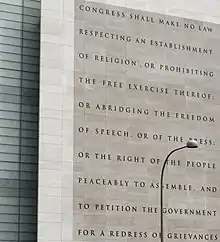First Amendment
English
WOTD – 28 September 2016

The First Amendment to the United States Constitution inscribed on the facade of the Newseum in Washington, D.C., USA
Alternative forms
- 1A (abbreviation)
- 1st Amendment
Pronunciation
Audio (AU) (file) - Hyphenation: First Amend‧ment
Proper noun
- The amendment to the constitution of the United States pertaining to freedom of speech, freedom of religion and freedom of the press.
- Our First Amendment class discussed the McCain-Feingold Act today, and I'm convinced people who claim money should be granted First Amendment protection are just defending the corrupt status quo of decades past.
- 1871 May, Circuit Judge William Burnham Woods, “The Power of Congress to Pass the Enforcement Act—The Fourteenth Amendment Construed—The Rights of Citizens of the States and United States Considered.—The United States v. John Hall, Jr., and William Pettigrew. Heard before Woods, Circuit, and Busteed, District JJ., on demurrer to the indictment. [U.S. Circuit Court, 8. D. of Alabama.]”, in The Internal Revenue Record and Customs Journal: A Weekly Register of Official Information on Internal Revenue and Customs, volume XIII, New York, N.Y.: W[illiam] C[onant] & F[rancis] P[harcellus] Church, publishers, office, no. 39 Park Row, →OCLC, page 182, column 3:
- What are the privileges and immunities of citizens of the United States here referred to [in the Privileges or Immunities Clause of the Fourteenth Amendment to the United States Constitution]? […] Among these we are safe in including those which in the Constitution are expressly secured to the people, either as against the action of the Federal or State governments. Included in these are the rights of freedom of speech, and the right peaceably to assemble. […] We find that Congress is forbidden to impair them by the first amendment, and the States are forbidden to impair them by the fourteenth amendment.
- 1981, Thomas A. Schwartz, A Reconceptualization of the First Amendment: The Burger Court and Freedom of the Press, 1969–1980 (unpublished Ph.D. dissertation), Carbondale, Ill.: Southern Illinois University at Carbondale, →OCLC, page 224:
- One scholar has noted that the [Warren Earl] Burger Court has invalidated more statutes on First Amendment grounds than any previous "court" […]
- 2002, Clyde E. Willis, “Preface”, in Student's Guide to Landmark Congressional Laws on the First Amendment (Student's Guide to Landmark Congressional Laws), Westport, Conn.: Greenwood Press, →ISBN:
- We have enshrined some of the most cherished rights of Americans in the First Amendment to the United States Constitution, including freedom of religion, speech, press, the right to assemble, and petition the government for a redress of grievances.
- 2002, David A[listair] Yalof, Kenneth Dautrich, “Preface and Acknowledgements”, in The First Amendment and the Media in the Court of Public Opinion, Cambridge: Cambridge University Press, →ISBN, page viii:
- By considering public opinion data on free press rights against the backdrop of modern First Amendment jurisprudence, we seek to offer new and original insights into the nature of popular support for these rights – and, in the process, we hope to provide a more sophisticated understanding of how the U.S. democratic system actually works
- 2014, Timothy Zick, “Exporting the First Amendment”, in The Cosmopolitan First Amendment: Protecting Transborder Expressive and Religious Liberties, New York, N.Y.: Cambridge University Press, →ISBN, page 346:
- The United States has generally not been successful in terms of exporting the First Amendment in the formal or legal sense, even to western democracies with which it shares much in common. Although they have rejected many of the First Amendment’s doctrines and standards, many nations have embraced its general norms, principles, and ideals. Indeed, the American First Amendment has had a profound and lasting effect on expressive and religious liberties throughout the world.
- 2019 July 29, Elizabeth Nolan Brown on Reason
- Section 230 Is the Internet's First Amendment.
Meronyms
Derived terms
Translations
part of the US Constitution
|
Further reading
- “First Amendment”, in Collins English Dictionary.
- “First Amendment, n.”, in Lexico, Dictionary.com; Oxford University Press, 2019–2022.
- “First Amendment”, in OneLook Dictionary Search.
- “First Amendment” in TheFreeDictionary.com, Huntingdon Valley, Pa.: Farlex, Inc., 2003–2024.
Further reading
 First Amendment on Wikipedia.Wikipedia
First Amendment on Wikipedia.Wikipedia
This article is issued from Wiktionary. The text is licensed under Creative Commons - Attribution - Sharealike. Additional terms may apply for the media files.